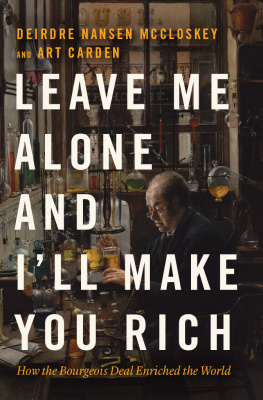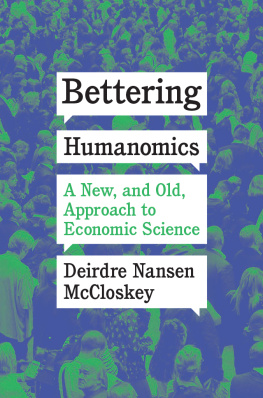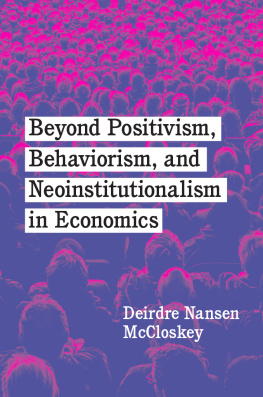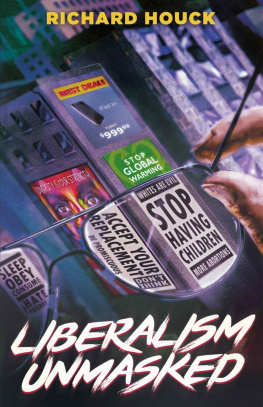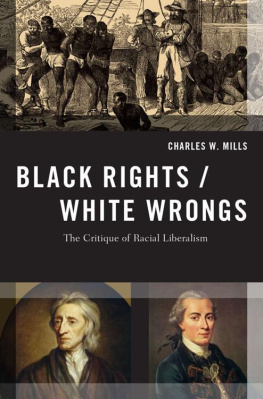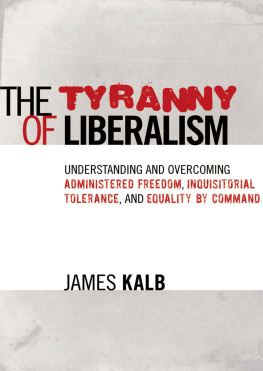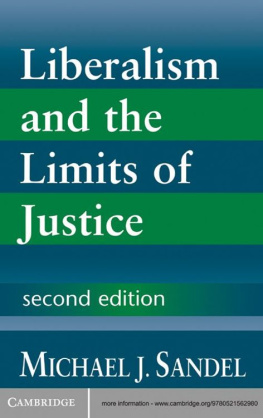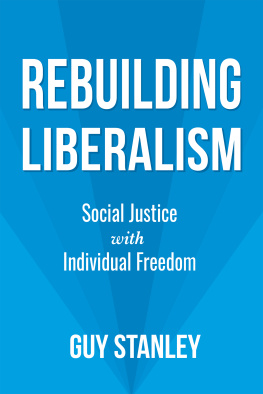Why Liberalism Works

Why Liberalism Works
How True Liberal Values
Produce a Freer, More Equal,
Prosperous World for All
Deirdre Nansen McCloskey

Copyright 2019 by Deirdre Nansen McCloskey.
All rights reserved.
This book may not be reproduced, in whole or in part, including illustrations, in any form (beyond that copying permitted by Sections 107 and 108 of the U.S. Copyright Law and except by reviewers for the public press), without written permission from the publishers.
was first published by the Institute of Economic Affairs, London, 2016.
was first published by Prospect magazine, March 2016.
Yale University Press books may be purchased in quantity for educational, business, or promotional use. For information, please e-mail (U.K. office).
Set in Fournier MT Std type by Westchester Publishing Services.
Printed in the United States of America.
Library of Congress Control Number: 2019937532
ISBN 978-0-300-23508-1 (hardcover: alk. paper)
A catalogue record for this book is available from the British Library.
This paper meets the requirements of ANSI/NISO Z39.48-1992 (Permanence of Paper).
10 9 8 7 6 5 4 3 2 1
Contents
Preface
By the time you finish this book, I hope I will have persuaded you of the case for a new, and old, liberalism. The L-word is not taken to mean US liberalism, the distressingly anti-liberal, lawyer-driven politics of increasing governmental planning and regulation and physical coercion. It is instead the rest of the worlds liberalism, economist driven, the liberal plan, as old Adam Smith wrote in 1776, of [social] equality, [economic] liberty and [legal] justice, with a modest, restrained government giving real help to the poor.
I am arguing for the continuing desirability of a liberalism conceived in the eighteenth century (so original and up to date am I), an idea slowly implemented after 1776, with many hesitations and false turns. I began to realize around 2005 or so that a liberal rhetoric explains many of the good features of the modern world compared with earlier and illiberal rgimesthe economic success of the modern world, its splendid arts and sciences, its kindness, its toleration, its inclusiveness, its cosmopolitanism, and especially its massive liberation of more and more people from violent hierarchies ancient and modern. Progressives and conservatives and populists retort that liberalism and its rhetoric also explain numerous alleged evils, such as the reduction of everything to money and markets or the loss of community and God or the calamity of immigration by non-whites and non-Christians. But they are mistaken.
From the Philippines to the Russian Federation, from Hungary to the United States, liberalism has been assaulted recently by brutal, scare-mongering populists. A worry. Yet for a century and a half the relevance of liberalism to the good society has been denied in a longer, steadier challenge, by gentle or not-so-gentle progressives and conservatives. Time to speak up.
It is an optimistic book, piercing the sky-is-falling gloom which seems always to command a ready market. The pessimism is expressed innocently, even proudly, by good-hearted scholars and editorial writers. But then it is appropriated by bad-hearted tyrants in order to push people around. First, absolutely terrify the people. The terrorists are coming. Even my good friends the good-heartedthe slow socialists and moderate conservativescall up pessimisms about the economy or the environment or the greatness of the nation, with similar consequences. Look at American politics after 9/11 or during Trump, or look as far back as British politics in the Gordon Riots or in the age of the French Revolution. Terrorism works with more than guns and bombs and guillotines.
The point here is to convert you to a humane true liberalism, which you probably harbor anyway. Modern liberalism. You dont really favor pushing people around with a prison-industrial complex, or with regulations preventing people from braiding hair for a living, or with collateral damage from drone strikes, or with a separation of toddlers from their mothers at the southern US border, do you? Ill bet not. As someone put it: Do unto others as you would have them do unto you.
I try here to follow also another old rule for liberalism, an intellectual version of the Golden Rule, articulated in 1983 by Amlie Oksenberg Rortyto listen, really listen, to your questions and objections. The book includes therefore interviews by journalists and other earnest doubters, who sometimes put forward well-intentioned but often illiberal objections to a free society.
The origins of the essays in varied audiences leave a residue of repetition, which I hope does not excessively grate. Ive tried to keep forward motion despite the repetition. And some of the repetitions are healthy, things you really, really need to knowchiefly that according to the scientific consensus in economic history, the much-maligned capitalism has raised the real income per person of the poorest since 1800 not by 10 percent or 100 percent, but by over 3,000 percent. Cheap food. Big apartments. Literacy. Antibiotics. Airplanes. The Pill. University education. The increase is a factor of thirty. That is, 30 minus the original, miserable, base of 1.0, all divided by the base is 29/1, to be multiplied by 100 to express it per hundredor a 2,900 percent increase over the base, 3,000 near enough. I will keep saying it, and keep dazzling you with my prowess in arithmetic, until you feel it on your pulse. It is the greatest, yet regularly overlooked, fact about the modern world. Most people by actual questionnaire think that since olden days the real capacity of poor people to buy goods and services has increased maybe 100 percent, at the outside 200 percent, a doubling or a tripling. Theyre quite wrong.increase has been much, much greater. If we appreciate it, the appreciation will transform all our politics. For example, the fact of the Great Enrichment is a crucial element in showing that humane true liberalism of the modern sort I advocate here is good and enriching, in every sense.
The Great Enrichment doesnt mean, of course, that theres nothing more to do in helping the poor, especially by ending the numerous, monstrous, and yet politically popular policies that in fact damage them worldwide. But it does mean that it is mischievous to attack, as many political theories do, a capitalism that has done more than anything else to help the poor. The Great Enrichment doesnt mean that little bits of other systemsa soupon of socialism for worthy public projects, a cup of Christian charity for the poor, a tablespoon of encouragement to worker-owned cooperatives, such as law and accounting firmsare to be scorned. But it does mean that replacing the system as a whole would be disastrous for the poor, as it has been shown to be in the USSR after 1917, in Venezuela after 1999, and over and over again in between.
The book was not through-written, unlike my economic-historical trilogy backing up many of the factual claims made here. To make consecutive reading smoother Ive arranged the whole into a moderately coherent argument, the skeleton of which you can discern by reading slowly through the table of contents. Notice that part III is a detailed inquiry into the leading illiberal worry nowadays, the alleged rise of inequality, just to show that detailed inquiries are possible and yield liberalism-favoring results. Part IV deals in less detail with various other illiberal worries. Part of the thrilling drama of the present book is watching the rather obvious liberal ideas retailed here, peddled by me in essays from a miscellany of newspapers and magazines over the past few decades, seep into my slow-thinking economists mind. The seeping took place during my mad, program-less life from my early fifties on, changing gender, becoming a progressive Christian, embarking on explaining the nature and causes of the wealth of nations, seeing the eighteenth-century light.
Next page

